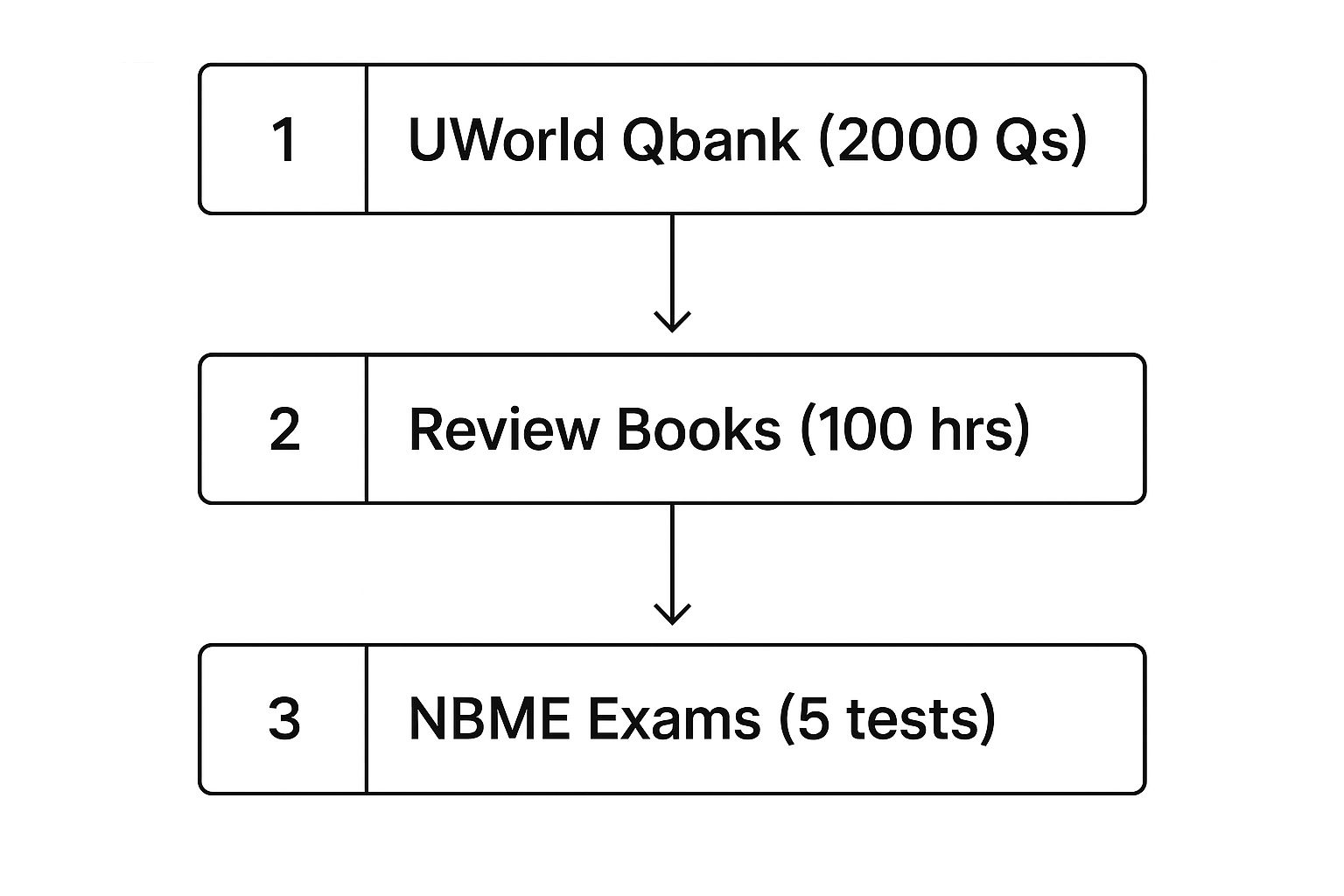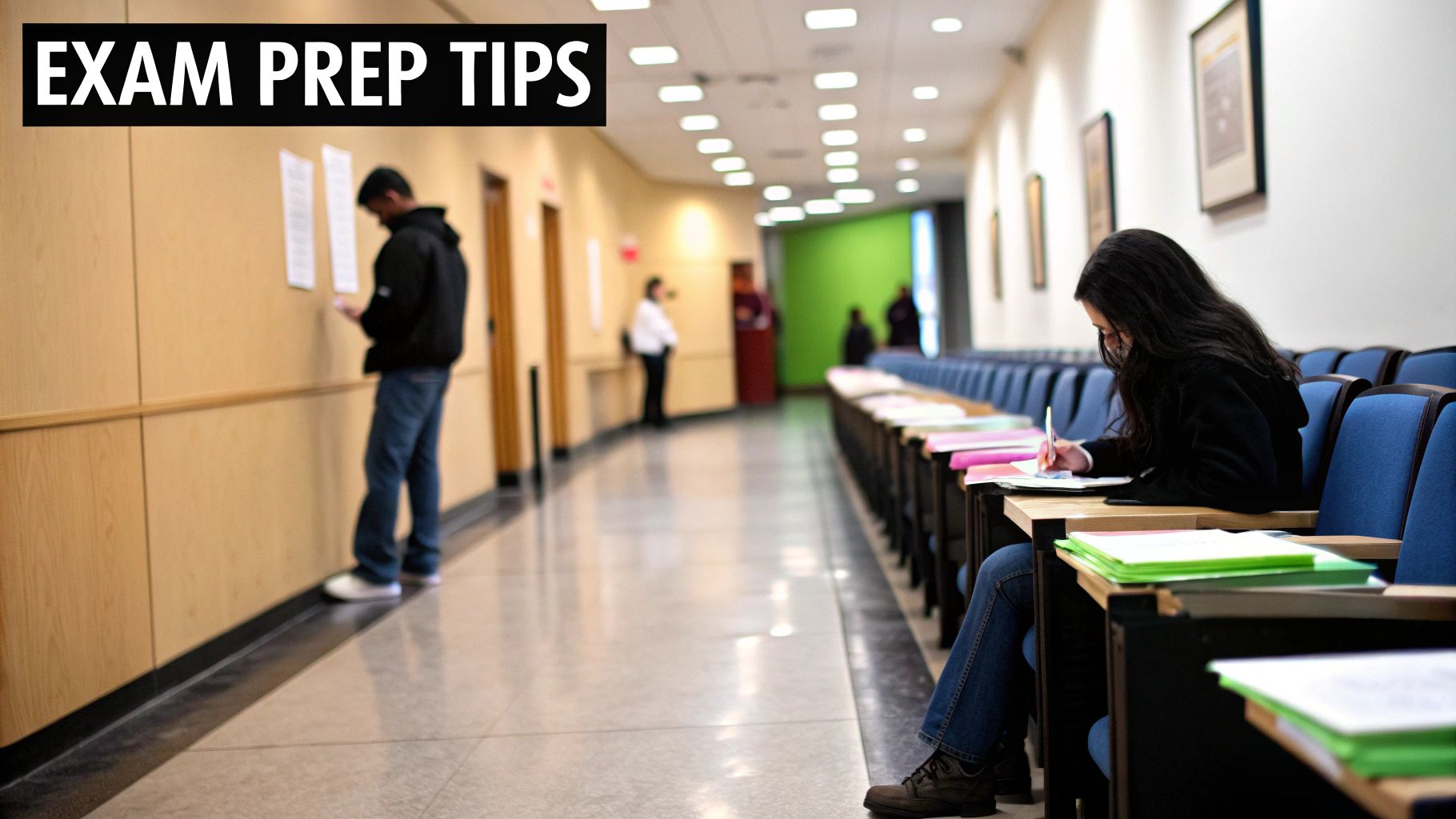Thinking about hiring a USMLE Step 2 CK tutor? For many medical students, it's a strategic move, especially now. With Step 1 officially pass/fail, your Step 2 CK score has become the single most important academic number you'll present to residency program directors.
This isn't just about passing anymore. It's about securing a score that opens doors to your dream specialty. That kind of performance often requires more than just a generic study plan. Personalized guidance can be the difference-maker between an average score and one that gets your application noticed.
Why a USMLE Step 2 CK Tutor Is a Smart Investment
Let's be blunt: the residency application game has changed. Your Step 2 CK score is now front and center, carrying an immense amount of weight. It's your prime opportunity to showcase your clinical thinking and stand out from a sea of other highly qualified applicants.
A common study plan or a question bank subscription is a great start, but they often fall short in one critical area: they can't diagnose the root cause of your struggles. Are you missing cardiology questions because of a genuine knowledge gap, or is the real issue your timing and test-taking strategy on those long, complex clinical vignettes?
A good USMLE Step 2 CK tutor doesn't just throw more facts at you. They dig deeper to find out why you're missing questions and provide targeted feedback that a Qbank explanation simply can't match.
Tackling Rising Standards and a Tougher Exam
The pressure is definitely on. Step 2 CK covers a massive amount of clinical information, from internal medicine to surgery, and the questions are designed to test your ability to think like a physician under pressure. It’s all about nuanced, next-best-step clinical reasoning.
To make things even more challenging, the bar is being raised. The USMLE Management Committee has officially announced an increase in the Step 2 CK passing score from 214 to 218, effective July 1, 2025. This isn't a huge jump, but it signals a clear trend: you'll need to demonstrate an even higher level of mastery. You can read more about this update on the official USMLE site.
A great tutor doesn’t just teach you facts; they teach you a framework for thinking. They help you deconstruct complex questions, identify distractors, and build the clinical reasoning skills that are essential for both the exam and your future career as a physician.
Before deciding, it's helpful to assess your own situation. Many students find themselves in common predicaments where a tutor can provide a clear path forward.
Key Signs You Might Benefit from a Step 2 CK Tutor
Use this quick reference guide to self-assess your preparation challenges and determine if personalized tutoring is the right move for you.
| Your Challenge or Goal | How a Tutor Provides a Solution |
|---|---|
| "My practice scores have plateaued, and I don't know why." | A tutor conducts a diagnostic assessment to pinpoint specific weaknesses, whether they are in content, strategy, or time management. |
| "I feel overwhelmed and don't know where to focus my study time." | They create a personalized, high-yield study plan that prioritizes your weakest areas, ensuring your effort is spent efficiently. |
| "I struggle with the timing on long question stems." | Tutors teach proven strategies for breaking down vignettes, identifying key information quickly, and managing the clock effectively. |
| "I need a top-tier score for a competitive specialty." | A tutor provides advanced strategies and in-depth content review to help you move from a good score to an exceptional one. |
| "I keep making the same types of mistakes on practice questions." | They help you perform a deep analysis of your errors, uncovering patterns in your thinking that you might have missed. |
| "I need accountability to stay on track." | Regular check-ins and structured sessions provide the accountability needed to maintain momentum and combat procrastination. |
If several of these challenges resonate with you, a tutor could be the catalyst you need to break through your current barriers and reach your goal score.
Maximize Your Study Efficiency
Ultimately, hiring a tutor is an investment in efficiency. It's about maximizing the return on your most valuable asset: your study time. Instead of spending weeks trying to figure out your own blind spots, a skilled tutor can often identify them in just a few sessions.
This personalized approach makes sure every hour you study is a high-yield hour, spent directly addressing your areas for improvement. A solid, structured plan is the bedrock of success, and our guide on how to study for Step 2 CK offers an excellent framework. A tutor can then help you customize that framework, avoid common pitfalls, and stay on the fastest path to achieving your peak performance.
Pinpointing Your Exact Tutoring Needs

Before you even type "USMLE Step 2 CK tutor" into a search bar, the most important work starts with you. I've seen countless students jump straight to hiring help, but the most successful tutoring relationships are built on a foundation of clarity. You have to move beyond that vague, sinking feeling of being "stuck" and get brutally honest about your specific areas of need.
This self-assessment isn't just a preliminary step; it's the bedrock for finding an expert who can deliver targeted, high-impact support instead of just a generic review.
Start by doing a deep dive into your practice exam data from UWorld or your NBME self-assessments. Don't just glance at the overall score. The real gold is in the patterns behind your incorrect answers.
Are you consistently bombing questions in a specific subject, like Psychiatry or Pediatrics? Or is the problem more about your process? Maybe you’re great at straightforward knowledge recall but completely fall apart on questions that demand complex lab interpretations under a ticking clock.
From Vague Feelings to Concrete Goals
This is where you translate those frustrating weaknesses into actionable goals. It’s a critical skill. Before reaching out to anyone, you need to learn how to set goals effectively for your USMLE prep. This clarity allows you to communicate your needs precisely and, just as importantly, measure your progress later on.
Here’s how you can reframe common struggles into specific, tutor-ready objectives:
Vague Feeling: "I'm just bad at Internal Medicine questions."
Concrete Goal: "I need to improve my ability to create differential diagnoses for Internal Medicine questions, specifically for presentations involving chest pain and shortness of breath."
Vague Feeling: "I keep running out of time on blocks."
Concrete Goal: "I need strategies to read long clinical vignettes more efficiently and consistently answer questions in under 90 seconds."
See the difference? This level of detail lets a potential tutor immediately grasp your challenges and know if their expertise is the right match. It changes the entire conversation from a generic "Can you help me with Step 2?" to a powerful "Can you help me solve this specific, measurable problem?"
The Importance of Score-Specific Targets
You also need to understand the scoring landscape to set goals that are both realistic and ambitious. The USMLE Step 2 CK is scored on a 1-300 scale, and the mean score usually hovers around 245.
But "average" isn't the goal for competitive specialties. For instance, the average matched applicant in internal medicine scores around 251. This data shows why targeted prep is so crucial—even a few extra points can dramatically change your residency options.
By clearly defining your weak points and your score targets, you empower a tutor to build a truly personalized plan. Your sessions transform from generic content review into focused, high-yield interventions designed to fix your exact problems.
This initial work ensures you invest your time and money wisely. It turns your tutoring from a simple review service into a strategic partnership geared for one thing: your success.
How to Find and Vet Qualified Tutors
Alright, you've done the internal work and know what you need. Now comes the hard part: finding the right USMLE Step 2 CK tutor. This isn't just about a quick Google search. Think of this process less like hiring a service and more like recruiting a key player for your medical education team—someone who will be in the trenches with you.
A great place to kick off your search is with established, reputable tutoring companies. These organizations usually have a deep bench of experienced tutors who’ve already been screened for their high scores and teaching chops. Going this route adds a layer of quality control and structure that you might not get from a solo tutor.
But don't stop there. Your own medical school is often a goldmine of resources. Check with your academic support office; they frequently keep lists of approved tutors. These are often senior students or residents who just crushed the exam and have intimate knowledge of your school's curriculum. This inside track can be invaluable.
The Initial Consultation Checklist
The consultation call is your interview. This is your chance to see if a tutor’s style and expertise actually line up with the goals you’ve set. You need to come prepared with sharp, insightful questions that cut through any sales pitch and get to the heart of their teaching method.
Here are a few questions I always recommend students ask:
- "How, specifically, do you use a student's practice exam data (like from UWorld or an NBME) to build your sessions?" A top-tier tutor won't just glance at your score. They should be able to articulate exactly how they diagnose error patterns and build a custom study plan from your performance analytics.
- "Can you walk me through your strategy for tackling timing issues on those crazy long clinical vignettes?" This question tests their practical, strategy-based coaching skills, not just their content knowledge. You need a strategist, not just a walking textbook.
- "What's your process for teaching something complex, like building a differential diagnosis or handling 'next-best-step' questions?" You're looking for an answer that describes active, case-based learning. If they just talk about reviewing slides, that’s a red flag.
- "How do you keep me accountable and track my progress between our sessions?" A great tutor does more than just show up for the call. They should have a clear system for assigning targeted homework and measuring your improvement week over week.
One thing you cannot be shy about is verifying credentials. It's perfectly acceptable—and smart—to ask for proof of their USMLE scores or to see testimonials from past students. Real, authentic reviews are worth far more than the polished blurbs on a website.
From Vetting to a Trial Session
The infographic below shows a pretty standard workflow for Step 2 prep. A good tutor’s job is to make every single one of these components more efficient and effective for you.

When you look at this, you can see all the time and resources that go into Step 2. A tutor should be an investment that maximizes the return on every hour you spend on UWorld, Anki, and practice exams.
Finally, and this is non-negotiable, always insist on a trial session. Even a brief, 30-minute consultation can tell you everything you need to know. This is your opportunity to evaluate their teaching style and—just as crucially—their personality. You’re going to be working closely with this person during a high-stress period, so having a good rapport is essential.
This one step can save you from locking in with a tutor who looks fantastic on paper but just doesn't click with how you learn. Honestly, it might be the single most important part of your entire decision.
What an Effective Tutoring Session Looks Like

So, what separates a good USMLE Step 2 CK tutor from a great one? A truly productive session goes way beyond just reviewing questions you got wrong.
Think of a top-tier tutor as a diagnostician for your study process. Their real job isn't to spoon-feed you answers; it's to dig deep and figure out why you're making mistakes in the first place.
The entire experience should be active and engaging. If you find yourself just passively listening to a lecture, something's wrong. A great tutor will facilitate a case-based, Socratic-style discussion, pushing you to articulate your entire thought process for a tough clinical vignette—from the initial differential to why you eliminated the other choices.
This is how you uncover the true source of your errors. Is it a real knowledge gap in cardiology? Or are you consistently misinterpreting lab values under the pressure of the clock? Maybe you have a flawed reasoning pattern when stuck between two very similar answer choices. Pinpointing these root causes is the only way to make lasting improvements.
Active Learning Over Passive Review
The goal of every single session should be to build and sharpen your framework for clinical thinking. It's not about cramming more facts into your brain. The dynamic has to be interactive and, frankly, a little demanding.
A highly effective session often looks like this:
- Live Problem-Solving: The tutor throws a challenging question at you, and you talk through your entire approach out loud. They'll jump in to probe your logic, challenge your assumptions, and correct flawed reasoning in real-time.
- Differential Diagnosis Drills: They might give you a patient presentation and have you build, rank, and defend a differential diagnosis. This forces you to connect the dots between pathophysiology and clinical signs.
- Pattern Recognition: A great tutor helps you see the bigger picture. They'll connect your scattered errors from a UWorld block to an underlying weakness, like a specific test-taking bias or a gap in a high-yield area.
The hallmark of a great tutoring session is leaving with a clearer understanding of how to think, not just what to know. You should feel like you’ve had a mental workout, emerging with new strategies to apply immediately.
Setting Expectations and Tracking Progress
An effective tutoring relationship is built on a foundation of clear goals and measurable results. Your tutor should work with you to set specific, achievable targets each week. This isn't just about hitting a certain number of questions; it's about mastering concrete skills.
For example, a weekly goal might be to "Improve accuracy on 'next-best-step in management' questions by 10%."
Productive sessions also end with a targeted "homework" prescription. This shouldn't be a generic task. It should be a custom assignment designed to fix the specific issues you just worked on, like a small Anki deck for a weak topic or a curated set of 20 UWorld questions focused on a reasoning challenge.
Following a structured plan is crucial. Our detailed Step 2 CK study schedule offers a solid framework that a great tutor can then tailor to your exact needs. Week after week, you should be using data from your practice exams to track your progress and fine-tune your strategy, ensuring every session builds directly on the last.
Common Mistakes When Hiring a Tutor
Hiring the wrong tutor can be an absolute disaster. It's a mistake that can sink your study plan, costing you precious time, money, and most importantly, your confidence. A bad tutor is honestly worse than no tutor at all because they can teach you ineffective strategies or, even worse, reinforce the bad habits you're trying to break.
The High-Score Trap
One of the most common pitfalls is getting dazzled by a high score. It’s so easy to assume someone who crushed the exam with a 270+ will be a fantastic teacher. But let’s be real—mastery of content and the ability to teach that content are two completely different skills.
A brilliant test-taker might not have the slightest idea how to articulate why a certain answer is correct or explain the subtle reasoning needed to get through a complex vignette. This is precisely why your vetting process needs to go beyond a simple score reveal. A great USMLE Step 2 CK tutor must be a skilled communicator and a diagnostic expert for your study problems, not just a high-scorer.
Overlooking Personality and Teaching Style
Another frequent error is completely ignoring the personality fit. You’re going to be spending a lot of hours with this person, often during a period of intense stress. If their teaching style feels condescending, if your personalities clash, or if they just don’t motivate you, the sessions will become a miserable and unproductive chore you dread.
Failing to establish clear, concrete goals from day one is another recipe for disaster. If you don't define what success looks like—whether it’s improving on specific question types, mastering a weak subject, or hitting a target score range—you'll have no real way to measure progress or hold your tutor accountable. The entire relationship will lack direction and focus.
A critical mistake is falling for a tutor offering a score "guarantee." These are almost always just marketing gimmicks. No one can ethically guarantee a specific score, as your performance ultimately depends on your own hard work and test-day execution.
The True Cost of a Bad Decision
Choosing the wrong support has serious consequences. The stakes are incredibly high. Just look at the official USMLE data: first-time pass rates for U.S. and Canadian MDs are at 98%, but that number plummets to only 74% for those who have to repeat the exam.
For international medical graduates, the drop-off is even more dramatic: from 89% for first-timers to a mere 61% for repeat takers. These stats paint a clear picture of how a failed first attempt dramatically lowers your odds, making your initial preparation strategy absolutely critical. You can explore more about these performance metrics on the USMLE website.
Similarly, be wary of any tutor still using outdated materials or a rigid, one-size-fits-all approach. The Step 2 CK exam evolves, and your tutor’s methods must reflect the current question styles and content distribution. This whole process is exhausting, and making the wrong choice can lead to significant frustration and burnout.
It's vital to recognize the signs of burnout and protect your mental well-being. This journey is a marathon, not a sprint. To help, check out our guide on how to handle USMLE exam burnout. Your goal is to find a strategic partner for your success, not just a temporary fix.
Frequently Asked Questions About Step 2 CK Tutoring

Deciding to get a tutor is a big step, and it’s natural to have questions. You’re making an investment in your future, after all. Let’s cut through the noise and tackle the most common things students ask when they’re thinking about hiring a USMLE Step 2 CK tutor.
How Many Hours of Tutoring Do I Really Need?
Honestly, there’s no magic number. Anyone who tells you there is probably just trying to sell you a package. The right amount of tutoring is completely unique to you—it hinges on your baseline knowledge, where your score is now, and where you need it to be.
For instance, a student gunning for a 10-point score bump might just need 10-15 hours to sharpen their test-taking strategy and drill some high-yield topics. But if you’re coming off a tough Step 1 experience or aiming for a super competitive specialty, you might be looking at 40-50 hours (or more) spread out over a few months. That gives you time to really rebuild weak conceptual foundations.
A great tutor won't just guess. They’ll start with a diagnostic to see exactly where you stand and then build a plan from there. Every single hour should have a purpose.
Is an Online Tutor as Effective as In-Person?
Absolutely. In fact, for a busy med student, online tutoring is often a game-changer. It’s far more convenient and blows the doors open geographically, giving you access to the absolute best tutors, not just the ones who happen to live in your city.
Modern online platforms are incredibly interactive. Think digital whiteboards for diagramming pathways, screen sharing for reviewing UWorld blocks together in real-time, and session recordings you can re-watch later. The medium isn't what matters—the quality and engagement of the tutor is everything.
What Should I Expect to Pay for a Quality Tutor?
The price tag for a good USMLE Step 2 CK tutor can swing pretty widely, usually anywhere from $75 to over $250 per hour. Why the big range? It really comes down to the tutor’s credentials, their track record, and the reputation of the company they’re with.
Tutors who are residents or fellows with a history of helping students crush their exams will naturally be at the higher end. While your budget is a real factor, try to think in terms of value, not just cost. A top-tier tutor who gets you to your goal score in 20 hours is a much smarter investment than a cheaper, less effective one you end up needing for 40 hours.
Should My Tutor Have a 270+ Score?
A stellar score is great, but it’s not the whole story. Not even close. The best tutors are phenomenal teachers first and great test-takers second. The real skill is being able to break down a complex idea in a way that just clicks for someone else.
Think about it this way:
- Tutor A: Nailed a 275 but gets frustrated when you ask questions and can't really explain how they think.
- Tutor B: Scored a solid 255 but has a gift for spotting your blind spots and teaching you practical, repeatable strategies.
Who would you rather work with? For almost everyone, Tutor B is the clear winner. Look for that perfect mix of strong scores, real teaching experience, and genuine, positive feedback from other students. Being a great test-taker and a great teacher are two very different skills.
Ready to stop guessing and start improving? The expert tutors at Ace Med Boards specialize in creating personalized study plans that target your specific weaknesses and maximize your score potential. Schedule your free consultation today and learn how we can help you conquer the Step 2 CK.

